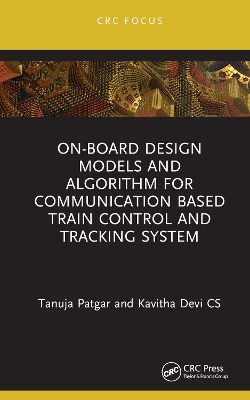
On-Board Design Models and Algorithm for Communication Based Train Control and Tracking System
CRC Press (Verlag)
978-1-032-27724-0 (ISBN)
Railway systems have a long history of train protection and control, as to reduce the risk of train accidents. Many train control systems include automated communication between train and trackside equipment. But several different national systems are still facing cross-border rail traffic. Today, trains for cross-border traffic need to be equipped with train control systems that are installed on the tracks.
This book covers the latest advances in Communication Based Train Control (CBTC) research in on-board components locomotive messaging systems, GPS sensors, communications wayside and switching networks. It also focuses on architecture and methodology using data fusion techniques. New wireless sensor integrated modeling techniques for tracking trains in satellite visible and low satellite visible environments are discussed. With a Tunnel Surveillance Integration model, the use of optimal control is necessary to improve train control performance, considering both train–ground communication and train control.
The book begins with the background and evolution of train signaling and train control systems. It introduces the main features and architecture of CBTC systems and describes current challenging methods and successful implementations.
This introductory book is very useful for Signal & Telecommunication engineers to get them acquainted with the technology used in CBTC, and help them in implementing the system suitable for Indian Railways. As this is a new technology, the information provided in this book is generic and will be subsequently revised after gaining further experience.
Kavitha Devi CS received B.E degree in Electronics and Communication Engineering from Visvesvaraya Technological University, Belgaum. Karnataka, India in 2002. In 2009, she received M.Tech in Computer Science Engineering Visvesvaraya Technological University, Belgaum.Karnataka, India. She is pursuing her PhD in "Design and Implementation of Compact Microstrip Filters" in Visvesvaraya Technological University, Belagavi, India. Her research interest includes Wireless Communication, Microwave and Engineering, Microwave devices, Antennas and wave propagation, Electromagnetic Waves, Wireless Sensor Network, Virtual Reality, Deep Learning, Data Science and Computer Vision with 27 paper publications, 1 international patent, vidwan score of 7.4, 2 silver medals in NPTEL courses, 8 Google scholar citations and RG Score 2.21(Research Gate). She is fellow member for I.S.T.E, I.E.T.E, C.R.S.I and I.S.S.S. Presently serving as Assistant Professor at Dr. Ambedkar Institute of Technology, Bangalore, India. Tanuja P. Patgar received B.E degree in Electronics and Communication from Kuvempu university, Karnataka, India in 1996. In 2010, she received M.E in Control and Instrumentation from University Vishweshraya Collage of Engineering, Bangalore, India. She received her PhD from Visvesvaraya Technological University, Belgaum, India in 2020. Her research field is Wireless Sensor Network, Artificial Neural Network, Machine learning, Deep Learning, Data Science and Computer Vision. She has pioneered research in wireless sensor network, control system and has published 35 international refereed Journal papers. She has edited several international and national journals, books and frequently gives invited keynote lectures at national. She is awarded with national Innovative Educationalist in Engineering and Technology, Maulana Abdul Kalam Azad excellence Award of Education, Talent Teacher Ideal Teacher Pratibha Puraskar, Best paper award. She is academic adviser for AI based startup. She has served as a Congress Chair for International Congress on Mobile and Wireless Hong kong and Technical Program Committee Member and Scientific Committee Member for IFERP and IAENG Conference. She is fellow member for I.S.T.E, I.E.T.E, I.S.A, IMAP, IFERP, IAENG and SDIWC. Presently serving at Dr. Ambedkar Institute of Technology, Bangalore, India.
1. Vision of Intelligent Control and Tracking Rail System: Global Evident Data 2. Train Navigation Control and Information Management System 3. Hybrid System for Train Tracking and Monitoring Model 4. Locomotive Tracking in SatelliteVisible And Low Satellite Visible Area 5. Train Trajectory Optimization Based On Di-Filter Theory 6. Heterogeneous Sensor Data Fusion DGPS-WSN-RFID-Based Train Tracking Model 7. Wireless Locomotive Real-Time Surveillance Model 8. Predictive Analysis of Intelligent Rail Trip Detection Service Using Machine Learning
| Erscheinungsdatum | 01.06.2022 |
|---|---|
| Reihe/Serie | Power Electronics and Applications Series |
| Zusatzinfo | 6 Tables, black and white; 30 Line drawings, black and white; 14 Halftones, black and white; 44 Illustrations, black and white |
| Verlagsort | London |
| Sprache | englisch |
| Maße | 138 x 216 mm |
| Gewicht | 260 g |
| Themenwelt | Technik ► Elektrotechnik / Energietechnik |
| Technik ► Fahrzeugbau / Schiffbau | |
| Technik ► Nachrichtentechnik | |
| Technik ► Umwelttechnik / Biotechnologie | |
| ISBN-10 | 1-032-27724-6 / 1032277246 |
| ISBN-13 | 978-1-032-27724-0 / 9781032277240 |
| Zustand | Neuware |
| Haben Sie eine Frage zum Produkt? |
aus dem Bereich


